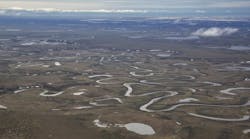Soldiers who die in battle receive national honors for service to their country. This is fitting and right. Firefighters and police officers who die in the line of duty receive widespread honor. This, too, is wholly right.
For people who die working on oil rigs, response differs. There is no national honor. There are no public memorials. The attention that befalls a fatal rig disaster treats names of the victims as less important than circumstances of their deaths. News stories focus on spectacle, spill threats, and politics. The people are anonymous hard-hats, regrettable in their loss but otherwise forgotten. If their work comes up at all, it's as the subject of questions about whether it even should be allowed. This is not right.
Accidents occur
Offshore oil and gas work is hard and hazardous. It occurs in cramped areas over water, close to combustible substances. It involves heavy machinery and rotating equipment. It exposes its practitioners to extreme natural forces from air, water, and earth. It separates workers from their homes and families for weeks at a time and can make some of them vulnerable to sullen moods or lapses of attention. For these reasons and others, despite meticulous precautions for which the offshore industry is legitimately proud, accidents occur.
The weeks and months ahead will be filled with exertions to determine cause of the explosion and fire that killed 11 people aboard the Deepwater Horizon semisubmersible drilling rig in the Gulf of Mexico on the night of Apr. 20. Eventually, technical reasons will emerge for the catastrophic escape of hydrocarbons following a cement job. Procedures will change. New precautions will appear. Blame will haunt individuals and institutions. Regulations will tighten. Lawsuits will flourish.
Inevitably, the Deepwater Horizon disaster will become a political bludgeon. It will be called a failure of regulation and practice, a reason to block offshore leasing and drilling and to quit using oil and gas.
So the Deepwater Horizon won't be forgotten. But the people who died in the disaster that sank it will be remembered only as elements of a fatality statistic.
Who were they?
According to news reports, they ranged in age from their early 20s to late 40s and had homes in Texas, Louisiana, and Mississippi. At the request of families, names were not published. These workers were not celebrities. People who knew them know what happened. To anyone else, names would mean little.
What should mean something beyond families and communities of the victims is what they did for a living. Nine worked for Transocean, two for M-I SWACO. They can be assumed to have possessed special skills. Whatever their jobs, they were nationally important people.
They were important because they helped supply oil and natural gas to a country richly dependent on economic energy. It's a country that appreciates neither the energy nor the industries that supply it nor the people who do the work. It's a country that resents its dependency, not realizing that the object of resentment comes with prosperity. It's a country that eventually will learn how much a government can waste trying to displace economic energy with preferred but uneconomic alternatives.
Meanwhile, Americans will continue to consume oil and natural gas. And professionals like those lost from the Deepwater Horizon will continue performing the nationally important work of bringing commercial energy in needed amounts to market.
Dangers real
Important work—and dangerous. Can it be that the important industry that supplies oil and gas tends publicly to underplay, for political and maybe recruitment reasons, the hazards of working around hydrocarbons, even as it strains to cut the risks? If so, it does its workers a disservice.
Oil and gas industry workers expose themselves to physical risk, however well managed it may be, to perform tasks vitally important to their country, however unappreciated they may be. While the dangers they face may not be quite like those faced by soldiers, firefighters, and police officers, they are real. The tragedy of Apr. 20 made this clear. The people who died were heroes.
More Oil & Gas Journal Current Issue Articles
More Oil & Gas Journal Archives Issue Articles
View Oil and Gas Articles on PennEnergy.com

